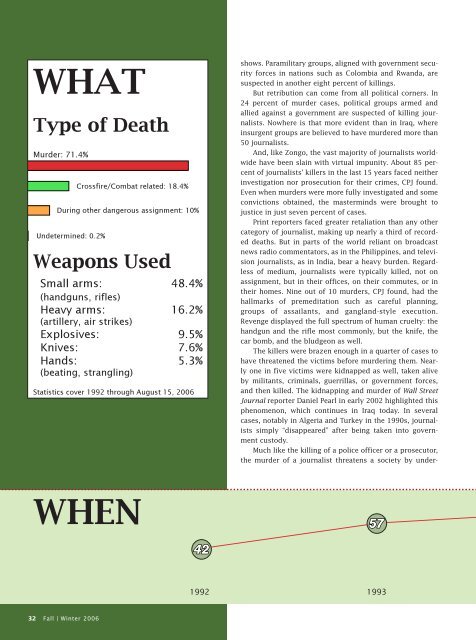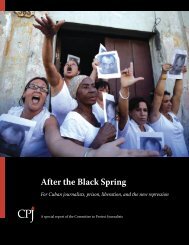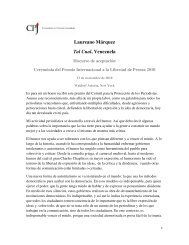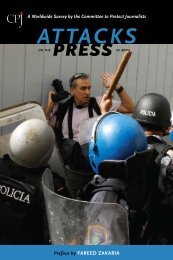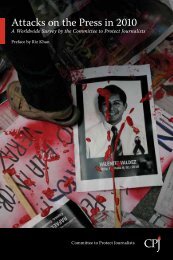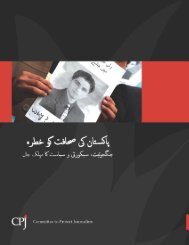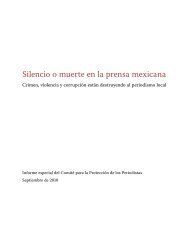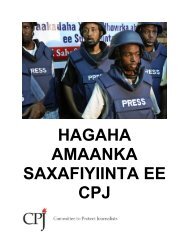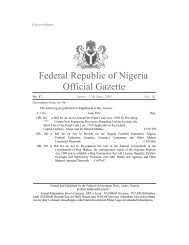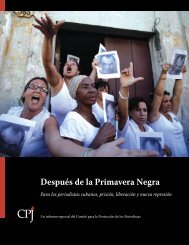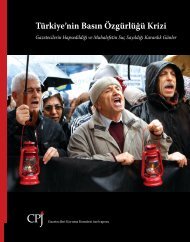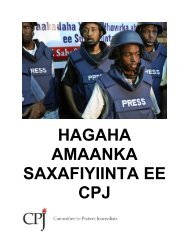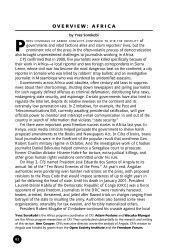Read the magazine online (PDF) - Committee to Protect Journalists
Read the magazine online (PDF) - Committee to Protect Journalists
Read the magazine online (PDF) - Committee to Protect Journalists
You also want an ePaper? Increase the reach of your titles
YUMPU automatically turns print PDFs into web optimized ePapers that Google loves.
Behind Prison Walls | Eritrea’s Secret Jails<br />
Khaled Abdu, once <strong>the</strong> <strong>to</strong>p edi<strong>to</strong>r of Admas, a private<br />
weekly in Eritrea, fled his homeland in 2000 after<br />
getting a series of threats from government agents.<br />
He was one of <strong>the</strong> lucky ones, as it turned out. In a massive<br />
crackdown in September 2001, <strong>the</strong> government rounded up<br />
and jailed many of Eritrea’s most prominent journalists and<br />
closed down all of <strong>the</strong> country’s private news outlets.<br />
The fate of those jailed journalists has become ever<br />
more precarious as this nation along <strong>the</strong> Red Sea has grown<br />
increasingly isolated. Abdu and several colleagues, believing<br />
<strong>the</strong>y might be <strong>the</strong> best way <strong>to</strong> draw international attention<br />
<strong>to</strong> <strong>the</strong>ir imprisoned colleagues, have launched an association<br />
of journalists in exile <strong>to</strong> report on <strong>the</strong> cases.<br />
At least 13 journalists are behind bars in Eritrea, with<br />
two more enduring prolonged forced labor euphemistically<br />
called “national service.” These grim statistics have made<br />
Eritrea one of <strong>the</strong> world’s five biggest jailers of journalists<br />
for five consecutive years, according <strong>to</strong> CPJ research. The<br />
imprisoned journalists have not been formally charged.<br />
Eritrean authorities have refused <strong>to</strong> discuss <strong>the</strong>ir whereabouts,<br />
<strong>the</strong> conditions of <strong>the</strong>ir imprisonment, or <strong>the</strong> precise<br />
nature of <strong>the</strong> allegations against <strong>the</strong>m.<br />
In a CPJ interview, presidential spokesman Yemane<br />
Gebremeskel denied that <strong>the</strong> journalists were imprisoned<br />
because of what <strong>the</strong>y wrote, saying only that <strong>the</strong>y “were<br />
involved in acts against <strong>the</strong> national interest of <strong>the</strong> state.”<br />
Alexis Arieff is a freelance writer and former senior research<br />
associate for CPJ’s Africa program.<br />
Slipping from Sight<br />
Their jailed colleagues vanishing in secret prisons, exiled Eritrean journalists<br />
seek <strong>to</strong> bring attention.<br />
By Alexis Arieff<br />
Neil Skene<br />
Imprisoned journalist Temesken<br />
Ghebreyesus, left, is seen here shortly<br />
before being arrested in 2001.<br />
Colleague Milkias Mihreteab, right,<br />
fled <strong>the</strong> country and is a member of<br />
<strong>the</strong> exiled Eritrean press group.<br />
He said “<strong>the</strong> substance of <strong>the</strong> case is clear <strong>to</strong> everybody” but<br />
declined <strong>to</strong> detail any supporting evidence.<br />
“We feel like <strong>the</strong>y are being forgotten,” said Abdu,<br />
whose Admas colleague, Said Abdelkader, is among those<br />
imprisoned. “Unless we address what happened, <strong>the</strong> outside<br />
world cannot do more.”<br />
Nei<strong>the</strong>r <strong>the</strong> Red Cross nor family members are allowed<br />
<strong>to</strong> visit <strong>the</strong> jailed reporters, making it difficult <strong>to</strong> determine<br />
<strong>the</strong> journalists’ health and, in some cases, whe<strong>the</strong>r<br />
<strong>the</strong>y are alive. What little information can be gleaned trickles<br />
out through members of <strong>the</strong> exile community. In 2002,<br />
for example, several journalists who escaped <strong>the</strong> country<br />
alerted CPJ that nine imprisoned journalists had been<br />
moved from police cells in <strong>the</strong> capital, Asmara, <strong>to</strong> secret<br />
detention facilities after <strong>the</strong>y attempted a hunger strike.<br />
The newly inaugurated Association of Eritrean <strong>Journalists</strong><br />
in Exile (AEJE) plans <strong>to</strong> disseminate information about<br />
<strong>the</strong> jailed journalists and o<strong>the</strong>r media-related issues affecting<br />
Eritrea. The association has launched a Web site,<br />
www.aeje.org, and its members stay connected through an<br />
e-mail listserv.<br />
“We want <strong>to</strong> advocate for our colleagues who are in jail,”<br />
said Aaron Berhane, a founding edi<strong>to</strong>r of a banned private<br />
newspaper, Setit, who now lives in Toron<strong>to</strong>. “We want <strong>to</strong><br />
record <strong>the</strong>ir his<strong>to</strong>ry, <strong>the</strong> work that <strong>the</strong>y have done, <strong>to</strong> bring<br />
<strong>the</strong>ir issue <strong>to</strong> <strong>the</strong> public.” Two of Berhane’s former co-workers<br />
are among those behind bars, including Fesshaye<br />
“Joshua” Yohannes, a 2002 recipient of CPJ’s International<br />
Press Freedom Award. Berhane escaped prison by going<br />
in<strong>to</strong> hiding, <strong>the</strong>n fleeing <strong>to</strong> Sudan.<br />
Several exiled journalists <strong>to</strong>ld CPJ that <strong>the</strong>y struggle<br />
with a sense of survivor’s guilt that <strong>the</strong>y made it out of<br />
Eritrea, while o<strong>the</strong>rs did not. They left behind not only<br />
those who were arrested, but also family members and<br />
friends who struggle with <strong>the</strong> daily hardship of living in<br />
one of <strong>the</strong> world’s poorest and most repressive countries.<br />
“Our major task is <strong>to</strong> address <strong>the</strong> human rights violations<br />
in Eritrea … and <strong>to</strong> prepare ourselves for Eritrea <strong>to</strong><br />
have a free and independent media,” Abdu said. AEJE’s two<br />
dozen members live around <strong>the</strong> world, primarily in Canada,<br />
<strong>the</strong> United States, and, like Abdu, in Sweden. They receive<br />
information from covert networks that include friendly government<br />
employees and security agents. AEJE’s membership<br />
counts former journalists from private newspapers, former<br />
state media employees, and diaspora Eritreans who have<br />
become involved in media in <strong>the</strong>ir adopted countries.<br />
Eritrea gained full independence from Ethiopia in 1993,<br />
after Eritrean and Ethiopian guerrilla fighters overthrew<br />
a ruthless military regime that had ruled over both terri<strong>to</strong>ries.<br />
Journalism enjoyed a brief heyday in <strong>the</strong> ensuing<br />
years. The nation’s first private newspapers were started in<br />
Asmara amid widespread optimism over <strong>the</strong> country’s<br />
future. “We never dreamt of going out of Eritrea,” recalled<br />
Abdu, who helped found Admas during that time.<br />
While initially supportive of <strong>the</strong> revolutionary government,<br />
Eritrea’s young journalists soon began <strong>to</strong> question<br />
increasingly au<strong>to</strong>cratic government policies and <strong>to</strong> press<br />
for democratic reform. A backlash followed. Neil Skene, an<br />
American journalist who led U.S. State Department-backed<br />
training seminars for journalists in Asmara between 1999<br />
and 2001, said a turning point came in 2000, when security<br />
forces briefly arrested several journalists, releasing <strong>the</strong>m<br />
President Isaias Afewerki’s administration is unwilling <strong>to</strong><br />
disclose details about 15 journalists jailed or held against<br />
<strong>the</strong>ir will.<br />
AP/Jean-Marc Bouju<br />
with warnings <strong>to</strong> tread carefully. “You could see <strong>the</strong> demise<br />
of democracy,” he <strong>to</strong>ld CPJ. “These guys without any his<strong>to</strong>ry<br />
of democracy, suddenly <strong>the</strong>y don’t have any idea how <strong>to</strong><br />
handle dissent.”<br />
On September 18, 2001, with world attention focused<br />
on <strong>the</strong> attacks on <strong>the</strong> World Trade Center and <strong>the</strong> Pentagon,<br />
<strong>the</strong> Eritrean government banned <strong>the</strong> private press for<br />
allegedly threatening state security and “jeopardizing<br />
national unity.” About a dozen independent journalists were<br />
rounded up by security forces, and, with <strong>the</strong> press out of<br />
business, <strong>the</strong> government canceled a general election. Hundreds<br />
of purported government opponents have since been<br />
jailed without due process.<br />
The irony of Eritrea’s bleak situation is that international<br />
media coverage has decreased as <strong>the</strong> political and humanitarian<br />
situation has worsened. While information flows<br />
more quickly and freely in much of Africa <strong>to</strong>day, Eritrea has<br />
gone <strong>the</strong> o<strong>the</strong>r direction. It has expelled international aid<br />
organizations, United Nations-backed moni<strong>to</strong>rs, and a foreign<br />
journalist who worked for Reuters and <strong>the</strong> BBC.<br />
To succeed, <strong>the</strong> AEJE must overcome fear and division<br />
that have kept many members of <strong>the</strong> diaspora from<br />
criticizing <strong>the</strong> government. Tesfaldet A. Meharenna, an<br />
Eritrean living in <strong>the</strong> United States who founded <strong>the</strong> popular<br />
Web site Asmarino, said it has not been easy <strong>to</strong> mobilize<br />
an outcry on human rights issues, partly because some<br />
exiled Eritreans fear that family members back home could<br />
be targeted. “The government works hard <strong>to</strong> play on that<br />
fear,” he <strong>to</strong>ld CPJ.<br />
O<strong>the</strong>rs keep quiet out of pride and a sense of solidarity.<br />
There is “a kind of shared belief on <strong>the</strong> part of many that<br />
<strong>the</strong>y’re a little country under siege from a hostile world,<br />
and <strong>the</strong>y can never say anything that’s going <strong>to</strong> make it look<br />
bad,” said Dan Connell, a U.S. journalist who has written<br />
several books on Eritrea.<br />
The AEJE’s mission is made more difficult, <strong>to</strong>o, by President<br />
Isaias Afewerki’s legendary capriciousness and disdain<br />
for international opinion. One heartrending scenario unfolded<br />
in November 2005, when <strong>the</strong> government briefly released<br />
Dawit Isaac of Setit, only <strong>to</strong> re-arrest him two days later, after<br />
he phoned his wife <strong>to</strong> tell her he’d been freed. Isaac holds<br />
dual Eritrean and Swedish citizenship, and his brief release<br />
came after behind-<strong>the</strong>-scenes lobbying by <strong>the</strong> Swedish government.<br />
Some observers speculated that Isaac’s re-arrest<br />
stemmed from <strong>the</strong> attention given his release.<br />
“We should have all kept quiet,” Meharenna said ruefully.<br />
Then, seeming <strong>to</strong> correct himself, he added: “See, that’s<br />
what <strong>the</strong>y want you <strong>to</strong> do.”<br />
The AEJE’s struggle is, in many ways, a battle against<br />
hopelessness. Abdu said he understands <strong>the</strong> fear and conflicted<br />
sentiments among <strong>the</strong> exiled community. “But we<br />
must go beyond that,” he said. “We have <strong>to</strong> feel like every<br />
Eritrean is our family.” ■<br />
64 Fall | Winter 2006<br />
Dangerous Assignments<br />
65


